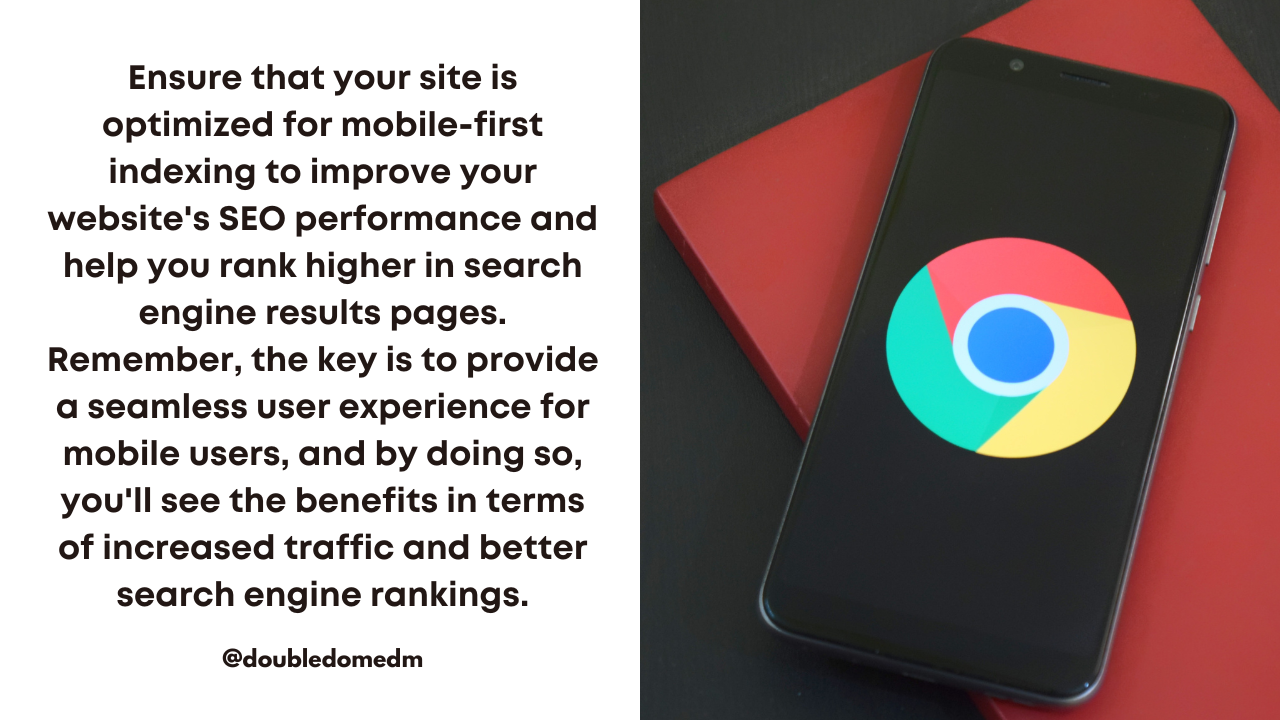Impact of User Experience on SEO Rankings: Boost Your Website’s Performance
User experience directly impacts SEO rankings by influencing factors such as bounce rate, time on site, and click-through rate. It is crucial to deliver a seamless and engaging user experience to improve website visibility and ranking on search engine results pages.
When users have a positive experience, they are more likely to stay on the site longer, interact with the content, and ultimately boost organic traffic. Additionally, search engines prioritize websites that provide valuable and relevant experiences to users, which can positively impact rankings.
As user experience continues to be a key ranking factor, optimizing UX design, site speed, and content engagement is essential for improving SEO performance.

Credit: www.firney.com
Importance Of User Experience
When it comes to SEO, user experience plays a pivotal role in determining search engine rankings. The way visitors interact with your website can heavily impact its performance in search results. Ensuring a seamless and satisfactory user experience is crucial for boosting your site’s visibility and attracting more organic traffic.
Characteristics Of A Good User Experience
- User-friendly interface
- Fast loading speed
- Intuitive navigation
- Consistent branding
- Clear call-to-actions
- Mobile responsiveness
Benefits Of A Positive User Experience
- Enhanced engagement and retention
- Reduced bounce rates
- Higher conversion rates
- Improved brand credibility
- Positive impact on SEO rankings

Credit: www.searchenginejournal.com
User Experience Metrics
The impact of user experience on SEO rankings cannot be overstated. User experience metrics play a crucial role in determining the success and visibility of a website. These metrics, such as page load time, mobile responsiveness, and bounce rate, directly influence how search engines evaluate and rank a website. Understanding and optimizing these key user experience factors is essential for improving SEO performance.
Page Load Time
Page load time refers to the duration it takes for a web page to fully display its content. A fast page load time is essential for providing a positive user experience and can significantly impact SEO rankings. Slow-loading pages can lead to higher bounce rates and lower user engagement, which in turn can negatively affect a website’s search engine rankings.
Mobile Responsiveness
Mobile responsiveness is a critical user experience metric that directly influences SEO rankings. With a significant portion of online traffic coming from mobile devices, search engines prioritize mobile-friendly websites. Ensuring that a website is responsive and optimized for various mobile devices can improve user experience, reduce bounce rates, and consequently enhance SEO performance.
Bounce Rate
Bounce rate is a measure of how quickly visitors leave a website after viewing only one page. A high bounce rate can signal poor user experience, potentially resulting from slow page load times, lack of mobile responsiveness, or irrelevant content. Search engines consider high bounce rates as a negative signal, which can impact a website’s SEO rankings.
Seo Ranking Factors
When it comes to achieving higher rankings in search engine results pages (SERPs), website owners and SEO professionals often focus on optimizing their content with relevant keywords, building quality backlinks, and improving site speed. While these are crucial factors, one aspect that usually gets overlooked but has a significant impact on SEO rankings is user experience.
Relevance Of User Experience To Seo
User experience (UX) plays a vital role in determining how visitors interact with a website. It encompasses various factors such as page loading speed, mobile-friendliness, intuitive navigation, and engaging content. Search engines like Google aim to provide the best possible results to their users, and that includes websites that offer a positive browsing experience.
When users find a website useful, relevant, and easy to navigate, it increases their dwell time and decreases the bounce rate. These metrics are essential for search engines to interpret the quality and relevance of a website. Therefore, an excellent user experience sends positive signals to search engines, potentially improving SEO rankings.
Google’s Core Web Vitals
Google recently introduced a set of metrics called Core Web Vitals, which are essential for understanding the user experience on websites. These metrics include:
| Metric | Description |
|---|---|
| Largest Contentful Paint (LCP) | The time it takes for the main content of a page to load. |
| First Input Delay (FID) | The time it takes for a website to respond to user interactions. |
| Cumulative Layout Shift (CLS) | The amount of unexpected layout shifts that occur while a page is loading. |
Google has confirmed that these metrics will directly impact search rankings starting May 2021. Therefore, website owners must prioritize optimizing their website’s performance in terms of LCP, FID, and CLS to ensure a positive user experience and maintain or improve their SEO rankings.
Other User Experience Factors
Aside from Google’s Core Web Vitals, there are several other user experience factors that can significantly affect SEO rankings:
- Mobile-friendliness: With the majority of online searches happening on mobile devices, having a responsive and mobile-friendly website is essential.
- Page speed: A slow-loading website can lead to high bounce rates and negatively impact SEO rankings.
- Clear and intuitive navigation: Visitors should be able to find what they’re looking for easily, enhancing the user experience and reducing bounce rates.
- Engaging and valuable content: High-quality and relevant content keeps users engaged, encourages repeat visits, and increases the chances of earning backlinks.
- Visual appeal and readability: A visually appealing website with legible fonts, proper spacing, and appropriate use of multimedia can enhance the user experience.
While these factors may seem secondary to traditional SEO strategies, neglecting them can hinder a website’s potential for higher rankings. Prioritizing user experience is not only crucial for SEO but also for building a loyal user base and driving organic traffic.
Ways To Improve User Experience
User experience (UX) plays a crucial role in determining your website’s SEO rankings. A positive user experience not only enhances the satisfaction of your visitors but also improves your website’s visibility and search engine rankings. In this section, we will discuss three effective ways to optimize user experience on your website: optimizing website speed, making it mobile-friendly, and enhancing website navigation.
Optimize Website Speed
A slow-loading website can lead to higher bounce rates and a negative user experience. To optimize website speed, consider implementing the following techniques:
- Enable browser caching to reduce load time for returning visitors.
- Optimize image sizes by compressing them without sacrificing quality.
- Minify HTML, CSS, and JavaScript files to reduce their file sizes.
- Use a content delivery network (CDN) to deliver your website’s content quickly to users worldwide.
- Invest in reliable hosting to ensure your website loads swiftly.
Make Website Mobile-friendly
In today’s mobile-centric world, having a mobile-friendly website is essential for a positive user experience and improved SEO rankings. Here’s how you can make your website mobile-friendly:
- Use a responsive design that automatically adjusts your website’s layout to fit different screen sizes.
- Ensure your font sizes are legible on small devices and avoid using excessive pop-ups that may hinder mobile navigation.
- Enable touch-friendly features, such as easily clickable buttons and menus.
- Test your website on various mobile devices and browsers to guarantee optimal performance.
Enhance Website Navigation
A well-structured and intuitive navigation system improves user experience by helping visitors find information quickly and easily. Follow these practices to enhance website navigation:
- Create clear and descriptive navigation menus that categorize your content logically.
- Include a site search feature to assist users in finding specific information.
- Use breadcrumb navigation to give users a clear understanding of their current location within your website.
- Ensure all links are working correctly and avoid broken links that may frustrate users.
- Optimize your internal linking strategy to guide users to relevant content.
Measuring And Monitoring User Experience
Measuring and monitoring user experience is crucial for SEO rankings. Understanding the impact of user experience helps improve website performance, engagement, and ultimately search engine visibility.
Introduction
Measuring and monitoring user experience is crucial in understanding how your website performs and determining its impact on SEO rankings. By gaining insights into how users interact with your site, you can make informed decisions to enhance their experience, improve SEO, and drive more organic traffic to your website.
Conducting User Surveys
To gain a deeper understanding of user experience, conducting user surveys is an effective strategy. Surveys provide valuable feedback directly from your target audience, helping you identify pain points, preferences, and areas for improvement. By using simple multiple-choice questions or open-ended prompts, you can gather valuable data about user satisfaction, website usability, and navigation.
When analyzing survey results, pay close attention to common issues reported and areas where users express frustration. This data can guide you in making necessary changes, optimizing your website to address these concerns, and ultimately improving SEO rankings.
Analyzing Website Analytics
Analyzing website analytics is another crucial tool in measuring and monitoring user experience. By examining data such as bounce rate, time on page, and conversion rates, you can gain valuable insights into user behavior and preferences. Additionally, analyzing demographic data, such as location and device usage, can help you tailor the user experience to specific target audiences.
Examining website analytics also allows you to identify the most popular pages and assess their effectiveness in providing a positive user experience. By understanding which pages generate the most engagement, you can prioritize optimizing those areas of your site to further enhance user experience and improve SEO rankings.
Regularly monitoring website analytics is essential to track the impact of any changes you make to your site based on user feedback or other factors. By comparing data over time, you can identify trends, measure the success of optimizations, and continuously improve user experience, ultimately boosting SEO rankings.

Credit: www.linkedin.com
Frequently Asked Questions Of Impact Of User Experience On Seo Rankings
Does User Experience Affect Seo?
Yes, user experience affects SEO. It impacts website engagement, bounce rate, and dwell time, influencing search rankings.
Is User Experience A Ranking Factor?
Yes, user experience is a ranking factor in search engine algorithms. It influences how visitors engage with your website, affecting its performance. Providing a positive user experience can improve your site’s search rankings.
What Are Two Factors That Influence Seo Ranking?
Two factors that influence SEO ranking are the relevance of the content to the search query and the authority of the website in terms of backlinks and quality of content.
How Ux And Seo Work Together?
UX and SEO work together by improving user experience on a website while optimizing it for search engines. By focusing on user-friendly design, clear navigation, and engaging content, UX ensures visitors stay longer and find what they need. In turn, SEO optimizes the site structure, keywords, and meta tags to improve visibility in search results.
Conclusion
In essence, user experience plays a pivotal role in determining SEO rankings. By ensuring a seamless and enjoyable user journey, websites can improve their chances of ranking high on search engine result pages. A user-friendly interface, fast loading times, and responsive design are all factors that search engines consider when determining the relevance and usefulness of a website.
Ultimately, prioritizing user experience not only enhances SEO rankings but also fosters a positive and satisfying online experience for users.
Related Posts
Recent Posts
- Optimizing Images for SEO and Page Speed: Boost Your Website’s Performance!
- Seo for Local Businesses Step-By-Step Guide: Boost Your Online Success Today!
- The Role of Content Clusters in Modern SEO: Boost Your Rankings
- Supercharge Your SEO Success with High-Quality Backlinks
- Impact of User Experience on SEO Rankings: Boost Your Website’s Performance
Recent Comments
Archives
Categories
Categories
- Blog(40)
- Local SEO(1)
- On-Page SEO(1)
- SEO(7)
- SEO Optimization(1)





